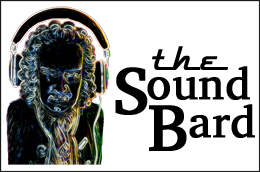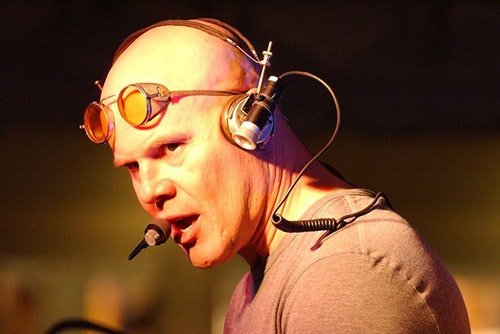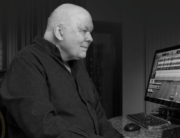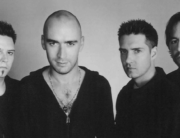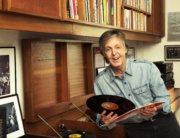BY MIKE METTLER – OCTOBER 17, 2016
Thomas Dolby has made a science out of knowing just how to fuse technology and self-analysis into his music for decades. And that’s not too surprising, coming from the vocalist and keyboard/synth maestro who brought us pioneering electronic-pop hits like “She Blinded Me With Science,” “Hyperactive!,” “One of Our Submarines,” and “I Scare Myself” during the ’80s heyday of MTV.
Dolby also dove headfirst into fueling the technology boom in Silicon Valley by figuring out how to share sound on the Internet. And now he has chronicled his creative thought processes for a new memoir, The Speed of Sound: Breaking the Barriers Between Music and Technology, available in various formats via Flatiron Books.
Over on Digital Trends, Dolby and I discussed breaking the music-genre barrier, the true arrival of the golden age of wireless, and the ultimate legacy of “Science.” Here, exclusively for The SoundBard, Dolby, 58, and I talk about the possibility of mixing his catalog in surround sound, the pitfalls of recording his audiobook, and why “Hyperactive!” wasn’t a bigger hit in the United States.
Mike Mettler: We were talking about how you’re not very happy about the sound quality in the download universe, and how people are missing out on all the work you put into each track you create.
Thomas Dolby: I think that’s even more true with multichannel formats like quadraphonic mixes and 5.1 mixes. You can trick yourself into believing the audience will have the same great experience you had in the studio, but that’s not the reality when you get it out there.
Mettler: My surround system is setup to sound like I’m in a studio environment, so I’m always ready for it. Have you thought about going back and doing surround mixes for any of your studio material?
Dolby: I’ve never been invited. If I was officially, I’d consider it.
Mettler: You’re officially invited!
Dolby: There is certainly a market for it. I think that anybody who is a fan, as you are of that style of audio experience, has a responsibility to go to any lengths to recreate the experience the way it was for the producer and the musicians in the studio. You owe it to them to hear it as close to what they intended as possible.
 Mettler: I’m always glad to do that. Personally, I would love to hear “Airhead” and “Budapest by Blimp” [both from 1988’s Aliens Ate My Buick] in surround. Those would be wonderful immersive experiences.
Mettler: I’m always glad to do that. Personally, I would love to hear “Airhead” and “Budapest by Blimp” [both from 1988’s Aliens Ate My Buick] in surround. Those would be wonderful immersive experiences.
Dolby: Yeah, well, if I’m ever asked to do it, I’ll consider it. I’ve tended to be snooty about formats like that in the past for the reasons I set out. Paul McCartney has a single-speaker cabinet that he repeatedly does his mixes through, because he believes the inherent sound of [The Beatles’] “Yesterday” is one you would hear coming out of an upstairs window or out of somebody’s car at a traffic light, with their window wound down. It’s just the essence of the song. It’s not about positioning your head between the speakers. So that’s an interesting point of view.
And I think he also views that, if people want to spend thousands on a great sound system and have it be even better, then that’s great. But the essence of the song is something I need to capture, and I can judge that by listening through just one 12-inch speaker.
 Mettler: You also mentioned that you were working on the audiobook for The Speed of Sound, which is probably a bit more challenging than it may sound to some people.
Mettler: You also mentioned that you were working on the audiobook for The Speed of Sound, which is probably a bit more challenging than it may sound to some people.
Dolby: Yes. Oh, it was really hard. I found it very hard.
Mettler: Had you ever done anything like that before?
Dolby: Not really. I’ve read stuff before for recordings — recited poems, and other things — but the weird thing was, these are stories I could tell you, and have been telling people, face to face for years. But then I had to write them down. And then I had to read back what I wrote down. (chuckles) It would almost be easier to just talk.
Mettler: Some stories probably need more inflection than others.
Dolby: The matter-of-fact stuff was not too hard, but the more emotional stuff was — and accents were too. Trying to do Michael Jackson, or Joan Rivers, you know… (chuckles)
Mettler: Were you trying to do it in their voices?
Dolby: No! (both laugh) So I’m trying to do a dialogue between me and Michael Jackson, and I do it all in my voice. It doesn’t really work, so you just have to modulate a tone or two.
Mettler: I’d like to hear the inflection you give him when he asks you about what the Iron Curtain was. I guess you never know what kinds of things people actually know about.
Dolby: Yeah yeah yeah. I was kind of amazed he knew about Tangerine Dream.
Mettler: I’m still trying to wrap my head around that one. That would have been an interesting collaboration, for sure.
Dolby: Yes.
Mettler: As you detail in the book, It’s a shame the internal politics at Capitol Records kept “Hyperactive!” from becoming a major hit for you [when it was released in 1984].
Dolby: You could also say it was to their credit that “She Blinded Me With Science” did as well as it did. When something is a hit, you just pat each other on the back, and crack the champagne. When something is an unexpected failure, fingers start to wag. Even if you have a great song, in order for it to be a hit, all of the stars need to be aligned. Sometimes they do, and sometimes they don’t.
When you’re following up a massive hit with a song that has the potential to do just as well, there’s more culpability there. and as I said in the book, there were some circumstances that really didn’t work in “Hyperactive!”’s favor in terms of the politics and the diplomacy, or lack thereof, that Capitol had in the industry at the time. They got into a huge fight with MTV, and they got into a conflict with independent radio promotion, the rather sinisterly titled “Network” — the “Hit Men,” as they were known. So “Hyperactive!” in the U.S. was definitely a victim of that. [“She Blinded Me With Science” reached #5 on the Billboard Hot 100 Singles chart in 1982, while “Hyperactive!” only got to #62 in 1984.]
The flipside of that was that “Hyperactive!”, in my home country the U.K., was a much bigger hit than “Science.” “Science,” in a way, was too homegrown. Dr. Magnus Pyke was a rather oversaturated BBC TV scientist, and having him on a record made people feel it was just a gimmick, really. “Science” was released two or three times in the U.K., and it barely got into the Top 50. But “Hyperactive!” was a much bigger hit over there. [“Hyperactive!” got to #17 on the British singles chart in 1984, while “She Blinded Me With Science” only reached #49 in 1982.]
Mettler: Not knowing the ins and the outs of the industry at the time like we have access to today, I was absolutely mystified as a buyer and lover of the “Hyperactive!” single as to why it didn’t get past a certain point on the charts. It seemed to be the natural next step of getting you as an artist to the next stage. At least from the artist’s perspective, you must have felt the creative progression you had made.
Dolby: I did feel a progression. The dirty laundry of the music industry then was not made aware to the general public, and stuff was going on week in and week out nobody was party to, outside of the industry.
Mettler: Hopefully, that leads people to discover a more heartfelt aong like “I Love You Goodbye” [the lead track from from 1992’s Astronauts & Heretics], which is the kind of thing you want people to ultimately find in your catalog.
Dolby: Absolutely. I could have been an easily little-known, marginalized kind of artist, and songs like “I Love You Goodbye” would have had a far less wide reach were it not for the success of “She Blinded Me With Science” and “Hyperactive!” so, yeah — it’s all good.
